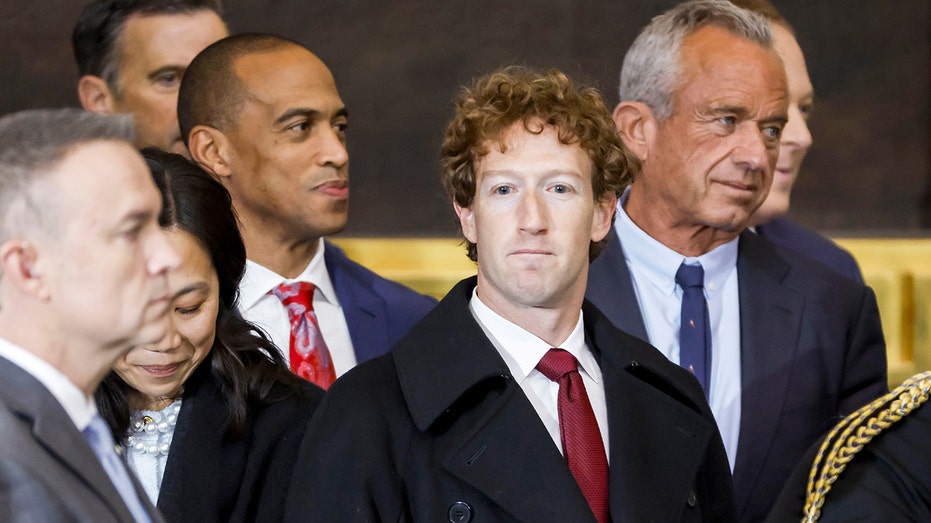Meta CEO Mark Zuckerberg appeared in federal court Monday to testify on the first day of a landmark antitrust case against his company — one that accuses Zuckerberg and other senior leadership of illegally purchasing smaller apps like Instagram and WhatsApp to create a social media monopoly.
Lawyers for the Federal Trade Commission said in opening remarks Monday they will seek to prove, over the course of the weeks-long hearing, that Meta purchased Instagram and WhatsApp as part of a so-called “buy or bury” strategy used to snuff out competition and alternatives, especially from apps it deemed to be a threat to their platform.
“They decided that competition was too hard, and it would be easier to buy out their rivals rather than compete with them,” FTC lawyer Daniel Matheson said Monday.
HAWLEY DEMANDS ZUCKERBERG TESTIFY ON ALLEGED TIES BETWEEN META, CHINA
For more than a decade, he argued, this strategy allowed Meta to purchase their competition for far above market value — establishing so-called “entry barriers” to protect their social media dominance.
Matheson and the FTC are accusing Meta of employing the strategy to gain a monopoly on the so-called “personal social networking” market.
If successful, the FTC would likely seek the court to order Meta to restructure its company, or to divest from acquired companies, including Instagram and WhatsApp.
The victory would be a notable win for the federal government at a time when it has struggled to prevail in court challenges involving Silicon Valley and its complex network of start-ups that ballooned, seemingly overnight, into major companies.
Meta is now worth $1.4 trillion. If FTC lawyers prevail in their antitrust lawsuit against Meta, it would be the largest disbanding of a U.S. company since the government-ordered the breakup of AT&T in the early 1980s.
TRUMP’S FORMER ENERGY CHIEF SOUNDS ALARM ON EXIM-BACKED GAS PROJECT AS THREAT TO AMERICA FIRST ENERGY AGENDA

Despite the long tail of the lawsuit, which is expected to play out in federal court through early summer, lawyers for the FTC wasted little time Monday in calling their first witness, Meta CEO Mark Zuckerberg, to the stand.
There, Zuckerberg was grilled over emails he sent regarding the purchase of Instagram and WhatsApp in 2012 and 2014, respectively.
In the 2012 email, Zuckerberg said Instagram had seen such fast growth that his own company “had” to purchase it, in Matheson’s telling.
“It’s an email written by someone who recognized Instagram as a threat and was forced to sacrifice a billion dollars because Meta could not meet that threat through competition,” Matheson said.
He also faced questions about Facebook’s transformation, which the FTC noted originated as a site designed to facilitate connections between peers to one that showcased more third-party content, including news and group activity.
“Over time, the ‘interest’ part of that has gotten built out more than the ‘friend’ part,” Zuckerberg said in response.
Zuckerberg said that users are now “connected to a lot more groups, and other kinds of things” compared to its earlier days.
“The ‘friend’ part has gone down quite a bit—but it’s still something we care about,” he said.
TRUMP FACES JUDGE BOASBERG OVER MIGRANT DEPORTATION FLIGHTS DEFYING COURT ORDER
Meanwhile, Meta’s attorney, Mark Hansen, sought to dismiss the case in their opening remarks a “grab bag” of FTC theories “at war with the law.”
“The facts are going to prove that the FTC’s theories are all wrong,” Hansen told U.S. Judge James Boasberg, the presiding judge in the trial.
Meta’s lawyers have sought to dispute the FTC’s description of so-called “personal social networking” apps, and argued their pool of competitors is actually much bigger — extending to companies including TikTok, LinkedIn, and others.
During the hearing, Boasberg listened carefully and took notes, interjecting at times to ask questions or ask for additional details.
The bench trial will be decided by a single judge — in this case, Judge Boasberg — and is expected to last around eight weeks.
Later this week, the court is expected to hear from other former top officials at Meta, with witnesses including former Chief Operations Officer Sheryl Sandberg, former Chief Technology Officer Andrew Bosworth, and others.
Read the full article here


